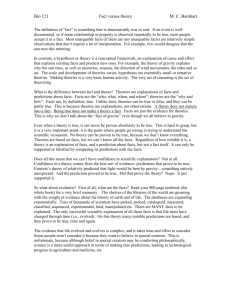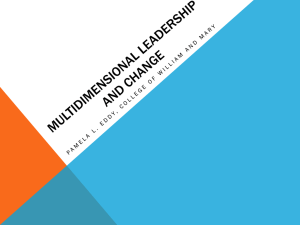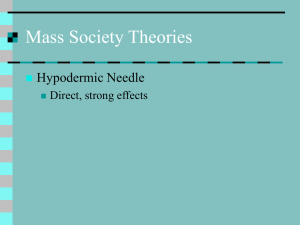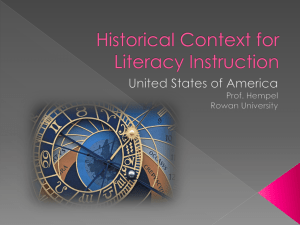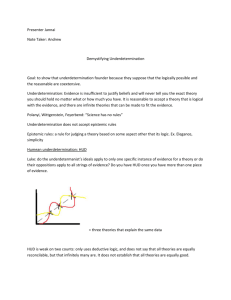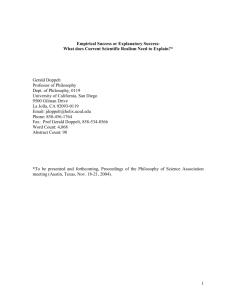Truth does not explain predictive success
advertisement
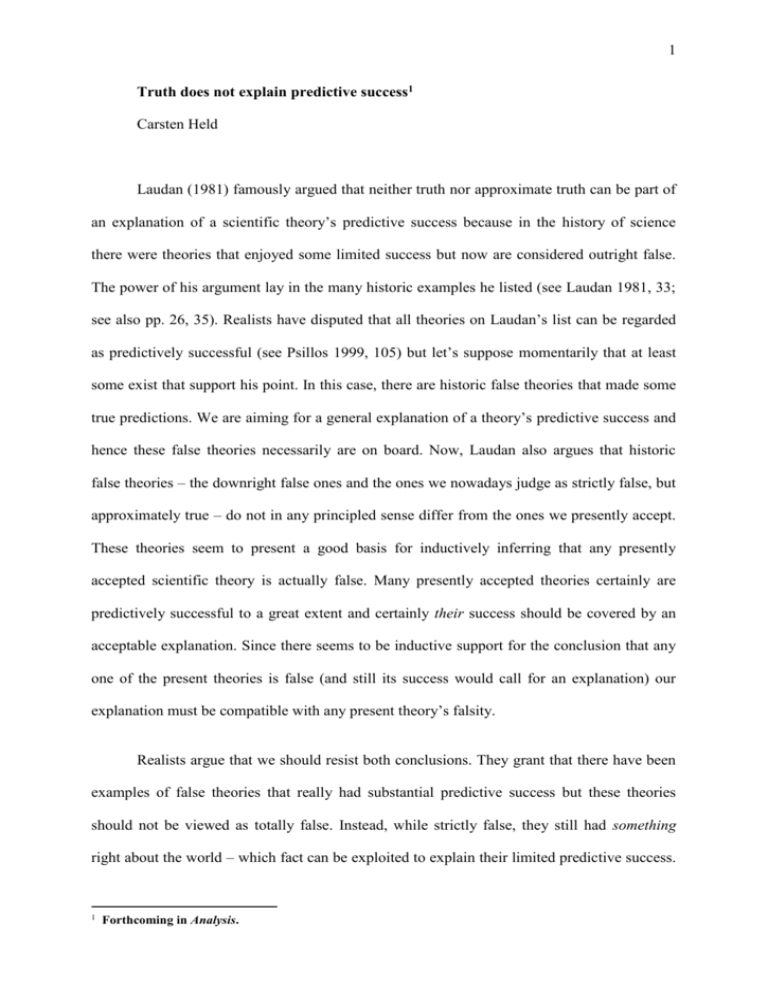
1 Truth does not explain predictive success1 Carsten Held Laudan (1981) famously argued that neither truth nor approximate truth can be part of an explanation of a scientific theory’s predictive success because in the history of science there were theories that enjoyed some limited success but now are considered outright false. The power of his argument lay in the many historic examples he listed (see Laudan 1981, 33; see also pp. 26, 35). Realists have disputed that all theories on Laudan’s list can be regarded as predictively successful (see Psillos 1999, 105) but let’s suppose momentarily that at least some exist that support his point. In this case, there are historic false theories that made some true predictions. We are aiming for a general explanation of a theory’s predictive success and hence these false theories necessarily are on board. Now, Laudan also argues that historic false theories – the downright false ones and the ones we nowadays judge as strictly false, but approximately true – do not in any principled sense differ from the ones we presently accept. These theories seem to present a good basis for inductively inferring that any presently accepted scientific theory is actually false. Many presently accepted theories certainly are predictively successful to a great extent and certainly their success should be covered by an acceptable explanation. Since there seems to be inductive support for the conclusion that any one of the present theories is false (and still its success would call for an explanation) our explanation must be compatible with any present theory’s falsity. Realists argue that we should resist both conclusions. They grant that there have been examples of false theories that really had substantial predictive success but these theories should not be viewed as totally false. Instead, while strictly false, they still had something right about the world – which fact can be exploited to explain their limited predictive success. 1 Forthcoming in Analysis. 2 Moreover, the historical record does not provide an inductive basis that is sufficiently strong for inferring that an arbitrary one of our present theories is entirely false. (See Psillos 1999, chap.5, for both arguments.) At this point, the debate on scientific realism hinges on whether there really exists an entirely false theory making true predictions. If it does then a general explanation of theory success must obviously be compatible with falsity, i.e. cannot consist in the assumption that a successful theory is true. So is there such a theory? This is an empirical question but luckily one we need not answer. I suggest looking at the mere possibility of there being a false theory making true predictions. And I claim that this suffices to establish the antirealist’s conclusion. Is it logically possible that a predictively successful theory is false? If the predicates ‘predictively successful’ and ‘false’ are logically independent (can consistently and jointly be predicated of a theory) it is, if not, not. Our answer, thus, depends on how we further analyze the predicates – and again there is room for argument. Consider however the following. Realists and antirealists agree about the ‘simple, incontestable fact that observational evidence is logically inconclusive with respect to the truth of theory’ (Leplin 2004, p. 119), i.e. that evidence underdetermines theory. It warrants nothing but ampliative (non-truth-preserving) inferences to the truth of a theory. This fact immediately shows the logical possibility of a false successful theory. Consider a successful theory T. The evidence E, from which we make abductive inferences to T’s truth, is identical with those of T’s predictions we know to be true. For simplicity assume that we checked all predictions produced from T and found them to be true so that the evidence simply consists of all of T’s true predictions and from them we infer abductively to T itself being true. By the inferences’ abductive character, E does not allow to conclude deductively to the truth of T – there is no derivation E |– T in, say, first-order logic. This is equivalent to saying that given the truth of E it is possible that T is false, i.e. there is a world that is a model of T & E. 3 Hence the logical possibility that a predictively successful theory is false can be straightforwardly concluded from the fact of underdetermination. Of course, this only establishes that successful theory T could be false, not the stronger claim that T could be false while being as successful as it actually is. One might suggest the following. T could be false but this possibility, if it were actualized, would damage its predictive success. So, vice versa, one can claim that in a case where T is successful its possible falsity remains unactualized. That is, one can claim that some world that is a model of E (like ours) might be not a model of T but if it were it would cease to be a model of E. Accordingly, it seems admissible to propose T’s truth as an explanation of its success even in light of underdetermination. The latter does entail that there is a possible world where E is true and T is false, but it does not entail that our world is such a world. However, it cannot be true that T’s falsity damages its success in the sense of entailing the falsity of E, i.e. T |– E, for that would imply that there is no world where T & E – contrary to what we just found. So at best T’s falsity is compatible with the one of E. While, due to underdetermination, there is a world that is a model of T & E one still is free to claim that there also is a world that is a model of T & E. The previous idea then would amount to saying that our world, by assumption an E-world, also is a T-world and that changing it into a T-world could also make it a E-world. Again, since it is not the case that T |– E the imagined change in our world is not determined to render E false. This, however, means that this change could equally well make our world a ( T & E)-world. So finally, since all we know about our world is its being an E-world we are never in a position to exclude that it is one where T & E holds. We are out for an explanation of T’s success and now must concede the possibility that T & E is true. Accordingly, T’s truth cannot be an explanation of its success. As T was arbitrary, this entails that an explanation of any 4 scientific theory’s predictive success must be compatible with the assumption that this theory is false. References: Laudan, Larry (1981), “A Confutation of Convergent Realism”, Philosophy of Science 48, 1948. Leplin, Jarrett (2004), “A Theory’s Predictive Success can Warrant Belief in the Unobservable Entities it Postulates”, in Christopher Hitchcock (ed.): Contemporary Debates in Philosophy of Science. Malden: Blackwell. Psillos, Stathis (1999), Scientific Realism: How Science Tracks Truth. London: Routledge
